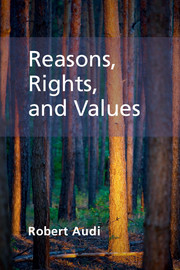Book contents
- Frontmatter
- Contents
- Preface
- Acknowledgments
- Introduction: practical reason, moral justification, and the grounds of value
- PART I REASONS FOR ACTION
- PART II INTUITION, OBLIGATION, AND VIRTUE
- PART III RELIGION, POLITICS, AND THE OBLIGATIONS OF CITIZENSHIP
- 9 Wrongs within rights
- 10 Religion and the politics of science: can evolutionary biology be religiously neutral?
- 11 Nationalism, patriotism, and cosmopolitanism in an age of globalization
- Index
10 - Religion and the politics of science: can evolutionary biology be religiously neutral?
from PART III - RELIGION, POLITICS, AND THE OBLIGATIONS OF CITIZENSHIP
Published online by Cambridge University Press: 05 May 2015
- Frontmatter
- Contents
- Preface
- Acknowledgments
- Introduction: practical reason, moral justification, and the grounds of value
- PART I REASONS FOR ACTION
- PART II INTUITION, OBLIGATION, AND VIRTUE
- PART III RELIGION, POLITICS, AND THE OBLIGATIONS OF CITIZENSHIP
- 9 Wrongs within rights
- 10 Religion and the politics of science: can evolutionary biology be religiously neutral?
- 11 Nationalism, patriotism, and cosmopolitanism in an age of globalization
- Index
Summary
Political decisions should be appropriately informed, and in much of the world the information that legislators and voters rely on is based on the results of scientific inquiry. If that inquiry is not itself free of political and other biases, then its role in providing a kind of neutral common ground between opposing political forces is threatened. Skepticism about the ‘value-neutrality’ of science is not new, but the striking advances and wider teaching of evolutionary biology have brought out both more writings and more protests by those who consider it biased against certain religious views and have made the question of its role in scientific education politically controversial. Evolutionary biology is a standard topic in scientific education in much of the world; but at least in the USA it remains a focus of controversy, and the growth of fundamentalist populations may be reason to think that it may become similarly controversial in other countries. This article explores the question whether evolutionary biology – and particularly the teaching of it – can be religiously neutral. The article will also have a wider bearing: it will argue for a general conception of scientific inquiry in relation to both religion and ethics, and it will outline a notion of religious neutrality that may be useful for both political theory and science policy.
In the USA many people who reject the religious neutrality of scientific inquiry have insisted that creationism be taught side by side with evolutionary theory, and the name ‘creation science’ has been used to suggest that this curricular demand does not imply that science instructors should endorse any religious position. The name ‘intelligent design’ (ID) is also intended to imply that science teachers introducing that perspective need not be committed to a religious position. The courts in the USA will likely continue to examine this issue. A major focus of their considerations has been what constitutes neutrality toward religion.
- Type
- Chapter
- Information
- Reasons, Rights, and Values , pp. 249 - 277Publisher: Cambridge University PressPrint publication year: 2015



